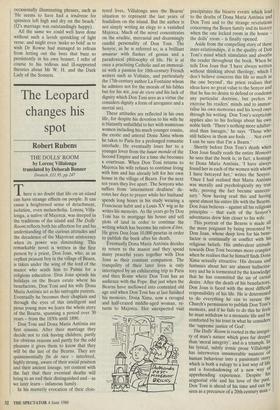The Leopard changes his spot
Robert Rubens
THE DOLLS' ROOM by Lorenc Villalonga translated by Deborah Bonner
Deutsch, £11.95, pp.247
There is no doubt that life on an island can have strange effects on people. It can cause a heightened sense of detachment, isolation, even melancholia. Lorenc Villa- longa, a native of Majorca, was steeped in the traditions of the island and The Dolls' Room reflects both his affection for and his understanding of the curious attitudes and the decadence of the Majorcan aristocracy when its power was diminishing. This remarkable novel is written in the first person by a priest, Don Joan, who, as an orphan peasant boy in the village of Beam, is taken under the wing of the lord of the manor who sends him to Palma for a religious education. Don Joan spends his holidays on the Beam estate where his benefactors, Don Toni and his wife Dona Maria AntOnia act as his surrogate parents. Eventually he becomes their chaplain and through the eyes of this intelligent and pious young man we learn the whole story of the Beams, spanning a period over 30 years — from the 1850s until 1890. Don Toni and Dona Maria AntOnia are first cousins. After their marriage they decide not to risk having children, partly for obvious reasons and partly for the odd pleasure it gives them to know that they will be the last of the Beams. They are quintessentially fin de race — interbred, highly strung, aware of their social position and their ancient lineage, yet content with the fact that their eventual deaths will bring to an end their distinguished and — as we later learn — infamous family.
In his masterly evocation of their clois- tered lives, Villalonga uses the Beams' situation to represent the last years of feudalism on the island. But the author is not simply writing an elegy to a vanished Majorca. Much of the novel concentrates on the erudite, mercurial and disarmingly candid personality of Don Toni. The Senyor, as he is referred to, is a brilliant amateur with flashes of genius and a paradoxical philosophy of life. He is at once a practising Catholic and an immoral- ist with a passion for 18th-century French writers such as Voltaire, and particularly the 17th-century author La Fontaine whom he admires not for the morals of his fables but for his wit, joie de vivre and his lack of dignity which Don Toni sees as a virtue (he considers dignity a form of arrogance and a mortal sin).
These attitudes are reflected in his own life, for despite his devotion to his wife he is blatantly unfaithful to her with numerous women including his much younger cousin, the exotic and amoral Dona Xima whom he takes to Paris for a prolonged romantic interlude. He eventually loses her to a younger lover from the haute monde of the Second Empire and for a time she becomes a courtesan. When Don Toni returns to Majorca his wife refuses to continue living with him and has already left for her own house in the village of Beam. For the next ten years they live apart. The Senyora who suffers from 'intermittent deafness' de- votes her days to prayer while her husband spends long hours in his study wearing a Franciscan habit and a Louis XV wig as he writes his memoirs. As the years go by Don Toni has to mortgage his house and sell plots of land in order to continue the writing which has become his raison d'être. He gives Don Joan 10,000 pesetas in order to publish the book after his death.
Eventually Dona Maria Antonia decides to return to the manor and they spend many peaceful years together with Don Joan as their constant companion. The tranquility of their later lives is only interrupted by an exhilarating trip to Paris and then Rome where Don Toni has an audience with the Pope. But just when the Beams have mellowed into contented old age and when Don Toni has at last finished his memoirs, Dona Xima, now a ravaged and half-crazed middle-aged woman, re- turns to Majorca. Her unexpected visit precipitates the bizarre events which lead to the deaths of Dona Maria Ant6nia and Don Toni and to the strange revelations concerning the Beam family and its history when the one locked room in the house — the dolls' room — is finally opened.
Aside from the compelling story of these inter-relationships, it is the quality of Don Toni's mind which stimulates and absorbs the reader throughout the book. When he tells Don Joan that 'I have always written without thinking about theology, which I don't believe concerns this life so much as the one beyond', the priest realises that ideas have no great value to the Senyor and that he has no desire to defend or condemn any particular doctrine, but prefers to exercise his readers' minds and to immor- talise his own memories and his loved ones through his writing. Don Toni's scepticism applies also to his feelings about his own noble birth. 'There's nothing more adulter- ated than lineages,' he says. 'Those who still believe in them are fools . . . Not even I can be sure that I'm a Beam.'
Shortly before Don Toni's death when Don Joan finally reads the entire Memoirs he sees that the book is, in fact, a homage to Dona Maria AntOnia. 'I have always found her in each of the women with whom I have betrayed her,' writes the Senyor. 'Once I had realised that Maria Antonia was morally and psychologically my true wife, proving the fact became unneces- sary.' Now having read this and having spent almost his entire life with the Beams, Don Joan believes — against all his religious principles — that each of the Senyor 's adventures drew him closer to his wife.
This portrait of the Beams is made all the more poignant by being presented bY Don Joan, whose deep love for his bene- factor is continually in conflict with his religious beliefs. His ambivalent attitude towards Don Toni becomes more complex when he realises that he himself finds Dona Xima sexually attractive. His dreams and fantasies about her are almost hallucina- tory and he is tormented by the knowledge that he has committed the sin of carnal desire. After the death of his benefactors, Don Joan is faced with the most difficult responsibility of his life. He is determined to do everything he can to secure the Church's permission to publish Don Toni s memoirs, and if he fails to do this he feels he must withdraw to a monastic life and be comforted by his trust in what he considers the 'supreme justice of God'. The Dolls' Room is rooted in the integri- ty of man's nature which goes far deeper than 'moral integrity', and is a triumph. In his lyrical, subtly ironic prose Villalonga has interwoven innumerable nuances of human behaviour into a passionate story which is both a eulogy to a lost way of life and a foreshadowing of a new way 0.f apprehending experience. Despite his seignorial role and his love of the past, Don Toni is ahead of his time and can be seen as a precursor of a 20th-century man Catholic or non-Catholic — with religious feelings, but pragmatic and enlightened.
Loreng Villalonga, who was born in 1897 and died in 1980, is considered in Spain to be one of the finest modern Catalan novelists. He went to universities in Mad- rid, Barcelona and Paris where he studied medicine, specialising in psychiatry. After his return to Majorca in his early thirties he wrote a short novel, La Muerte de Una Dama and he was a practising psychiatrist in Palma for most of his life. Presumably The Dolls' Room went through a long gestation period, for it was not written until he was middle-aged. Both his Spanish and English publishers have rightly com- pared it to Lampedusa's The Leopard (written after Villalonga's book) as there are definite similarities in theme and ambi- ence. But one important difference be- tween the two authors is that while Lampe- dusa wrote one masterpiece at the very end of his life, Villalonga went on to write many other brilliant novels. Surprisingly, this subtle translation by Deborah Bonner is the first to appear in English. Now we can at last look forward to reading the entire oeuvre.



















































 Previous page
Previous page